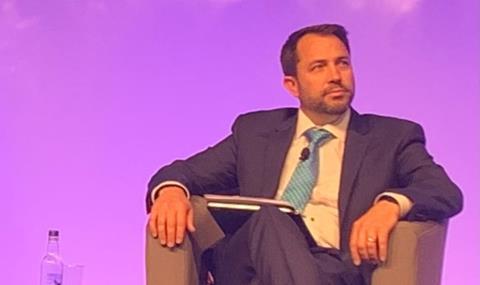
Hydrogen technology is currently the best way to decarbonise heavy trucks, according to Tesco transport director Matt Rhind (pictured).
Speaking in a panel debate at last week’s Microlise Transport Conference in Coventry, he said: “I talk to a lot of manufacturers and hydrogen is a thing. At the moment it’s feeling like a more viable option than electrification but let’s see where we are in 10 years’ time.
“We’ve got to gestate what it would mean to the infrastructure to produce green hydrogen because that’s one of the key points here - how is the hydrogen produced? And if it’s not green then we aren’t there environmentally.”
Rhinds said he welcomed new government emissions legislation but that it came with “complications”.
“Sometimes the legislation outstrips the readiness of the infrastructure,” he said. “But all our home delivery vans will be ready by 2028. Getting the grid operators to get behind that and make sure there’s enough infrastrucure to support it is one of the challenges. It’s going to be a collaborative thing. In a competitive landscape that’s really important.”
Fellow panellist Graham Lackey, chief executive of Brit European Group, said hydrogen could be a “stepping stone” in the shift to zero-emission HGVs.
However, he admitted the route to net zero for operators remained unclear: “In terms of the next steps, with the car market the technology is there but you worry about the infrastructure - it’s not really there. With vans the floodgates are just opening. The vehicle technology is there but is the infrastructure going to cope? With the heavier trucks, you might squeeze 12 tonnes on electric, but much more than that and you’re really pushing it for the foreseeable future.
"I don’t think there’s a clear path. You can choose your horse but at the moment I don’t know which one will win.”
Asked what technology was most exciting him, Lackey said: "Machine learning - AI. Taking live environmental data to predict what’s coming next - what the truck is doing, what the traffic and weather is doing, and how it’s going to affect the planned journey. You feed that back into a system that learns it and it becomes part of your route scheduling. So the guys in the office can see what's going to happen next rather than what’s already happened."
Rhinds agreed, insisting the sector's future is "super bright".
"There's so much new technology coming our way," he said. "Look at all the shared data. Look at all the bespoke systems that sit within a tractor, trailer or refrigeration with technology built in that allows you to proactively maintain vehicles so they don’t break down.
"It's all about predictiveness and keeping the driver knowing what's going on to prevent accidents. That’s going to be huge, and technology can achieve that. I'm really excited about what’s round the corner.
Initially, I think we’ll see autonomous vehicles shunting trailers round warehouses and making sure we’re safe. And long term, way down the line, we will see autonomous trucks on the roads and it will be super exciting. This industry has so much to go at."














